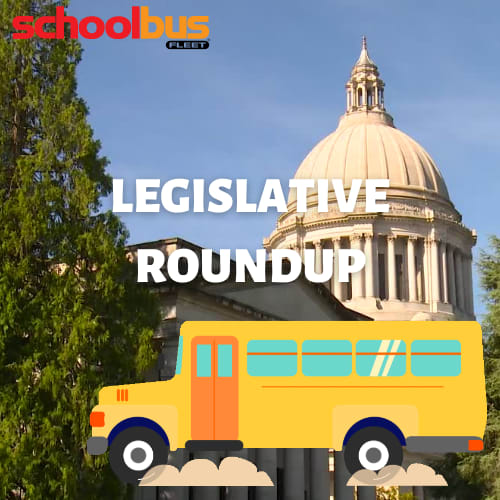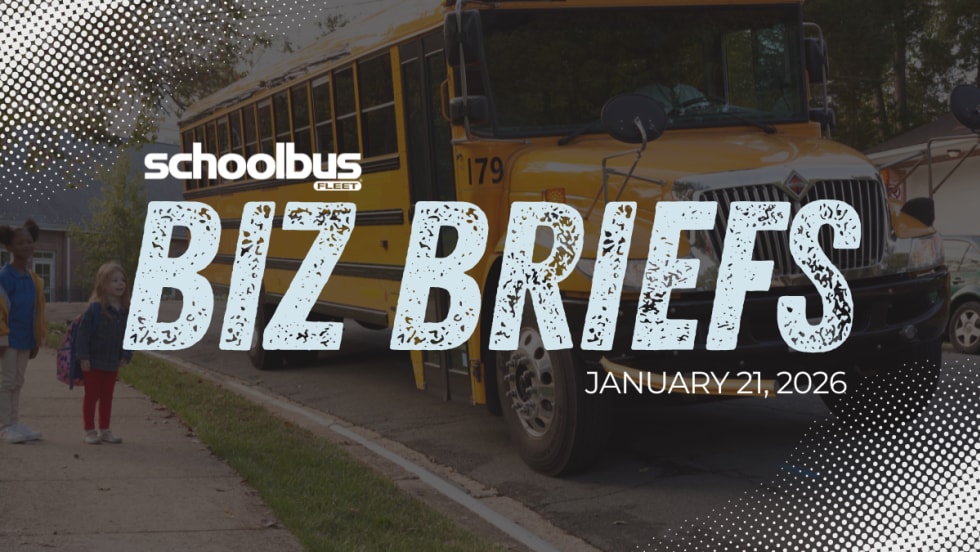Colorado Electric Bus Funding Signed into Law
Governor Jared Polis of Colorado has signed into law SB 193, which provides $65 million in funds for an electric school bus grant program that the state will distribute to school districts to help finance, buy, and maintain zero-emission school buses and install electric vehicle charging infrastructure.
“We commend Colorado for its continued leadership in transportation electrification,” said Ben Prochazka, executive director of the Electrification Coalition. “This monumental step will inspire states across the country to adopt electric buses, enabling a clean ride to school for all our children and accelerating our nation’s transition to a more secure and healthy transportation future.” He went on to urge lawmakers to adopt policies that take diesel buses off the road and help reduce dependency on fossil fuels.
New Jersey Legislature Passes Electric School Bus Bill
The New Jersey General Assembly on May 26 passed a bill that requires the state’s Department of Environmental Protection to develop and implement a 3-year electric school bus program.
The program, according to an Environment New Jersey news release, would “determine the operational reliability and cost effectiveness of replacing diesel-powered school buses with electric school buses for daily transportation of students.” The bill funds the program with a total of $45 million.
Said Anjuli Ramos-Buscot, director of New Jersey’s Sierra Club chapter: “The electric school bus bill is an important step in the right direction when it comes to getting electric vehicles, specifically electric school buses, on our roads. Children are among the most vulnerable to health impacts from air pollution caused by diesel emissions. … This legislation will strategically begin the process of replacing diesel school buses considering all NJ’s geographical areas while prioritizing Environmental Justice communities. Not only will this transition from diesel to electric reduce air pollution, it will also reduce operating costs to school districts in fuel and maintenance over the life of the bus.”
Said Doug O’Malley, director of Environment New Jersey: “More than 15 years ago, New Jersey voters overwhelming supported a ballot question to clean up dirty diesel school buses. Back then, we didn’t have any other option. Today, states around the country are leading the way to make the transition to electric school buses. Diesel emissions seep into the cabin of existing school buses and into the lungs of our children. It’s time to protect our kids’ health and our air quality by taking the first step to electrification.
Miranda’s Law Commemorates Victim of New Jersey Bus Crash
On May 17, fourth anniversary of the school bus crash in Paramus, N.J., that killed 10-year-old Miranda Vargas, U.S. Rep. Josh Gottheimer announced he would introduce Miranda’s Law with the intention of protecting children on America’s school buses. The law, if passed, would:
Require seat belts on all school buses, nationwide.
Establish 3-point lap-and-shoulder seat belts as the national standard.
Encourage innovative measures to ensure students actually wear their seat belts aboard school buses.
“I’m continuing to work to turn tragedy into hope for other children and families,” Gottheimer said in a news release. “With Miranda’s Law, we can help ensure that every child in America will be as safe as possible aboard a school bus, and we’re giving parents and families more peace of mind. Miranda’s Law will help save lives, and there’s nothing partisan about that.”
Vargas, a fifth grader, died after her bus driver apparently tried to make a U-turn and collided with a dump truck.
California Legislation May Prove Challenging for School Transportation
Middle and high school students in California on July 1 become the first in the country mandated to start later in the morning. State Bill 328, known as the Later School Start Time Act, was signed into law by Gov. Gavin Newsom in 2019. The legislation requires that middle and high schools begin no earlier than 8 a.m. and 8:30 a.m. respectively. This is expected to affect transportation routines for students and parents alike.
“I am concerned,” said Mark Luque, school superintendent in Bakersfield, according to 23ABC. “As the superintendent speaking for myself, as a representative of the district, I am not in favor of this change. I am both the superintendent but I am also a parent. I am the father of a high school student, so I understand how this is going to impact her schedule. When you factor in a district like BCSD where we are a large district, nearly 30,000 students, and we have a bus fleet that requires the staggered schedule to get our kids to and from school. Requiring us to start school after 8 o'clock creates immense pressure and results in what we're having now."














